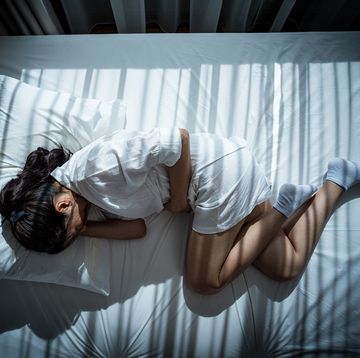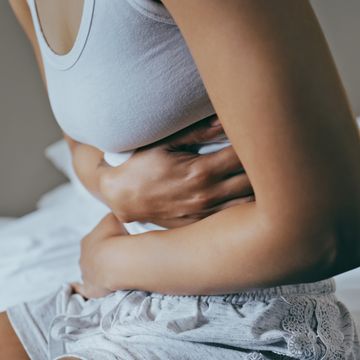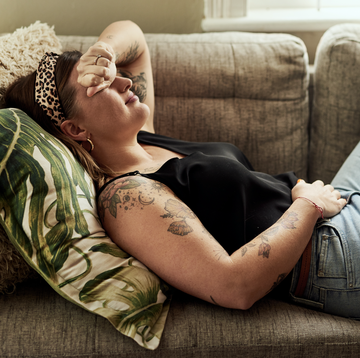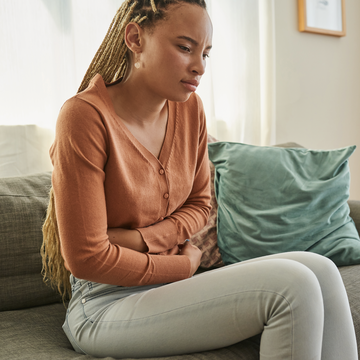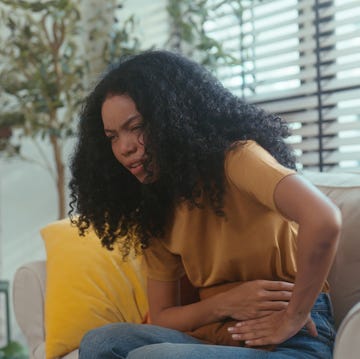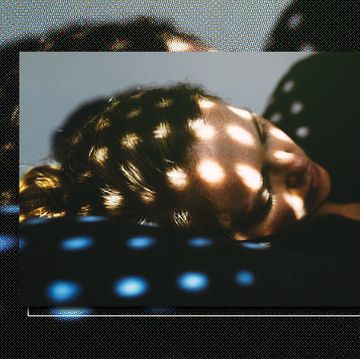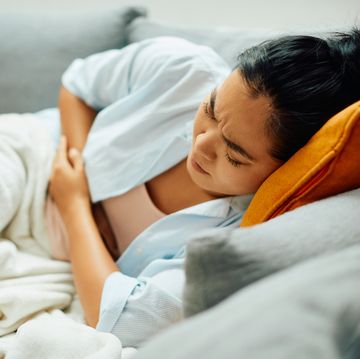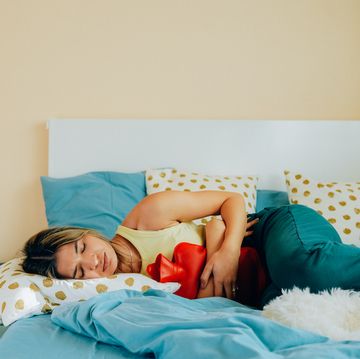Period pain is the absolute worst. But is there anything more frustrating than having period pain but no period to almost make them worth it? We think not.
Although cramps are most closely associated with periods, menstruation isn't the only reason why you might get pain that feels like period pain, but is in fact a sign of something else altogether.
If you're experiencing aches and pains in your pelvic area, they might be a sign that your body is trying to alert you to an underlying medical condition or health issue, so it's important that you don't ignore them.
Here, Dr Patricia Zabala, from gynaecology and assisted reproduction centre Institut Marques, details five common medical conditions where cramping (but no period) is a symptom...
1. Endometriosis
Endometriosis is a medical condition which occurs when the tissue lining a person's uterus grows in other areas of the body, such as the fallopian tubes, ovaries, or inside the stomach. This tissue still goes through the menstrual process, but unlike a normal period, this blood has no way to escape. As the conversation about endometriosis thankfully becomes more open, celebrities with endometriosis have been sharing their own experiences, from Molly Mae to Halsey.
"Pelvic pain is the main symptom of endometriosis," says Dr Zabala. "Many people with the condition will experience extremely painful and, in some cases, incapacitating cramps during their period. They may also experience cramping throughout the whole menstrual cycle. Unfortunately, there is currently no cure for endometriosis, and an endometriosis diagnosis can take an average of eight years. However, there are a number of ways in which patients can manage their symptoms effectively – through lifestyle changes and surgical treatments."
Other endometriosis symptoms include pain during sex, painful urination on your period, heavy periods, diarrhoea, constipation and nausea.
2. Irritable Bowel Syndrome (IBS)
IBS is a common, long-term condition of the digestive system which causes a range of symptoms in the gut, including stomach cramps, bloating, diarrhoea and constipation. IBS often causes the muscles in the gut to contract more than is necessary for normal bowel movement. This can then lead to lower abdominal pain and cramping. "There's no single treatment or diet that works for sufferers of IBS, but lifestyle changes such as getting plenty of exercise, taking probiotics and cooking homemade meals with fresh ingredients, can help relieve symptoms," says Dr Zabala.
3. Pelvic Inflammatory Disease (PID)
You might not have heard of it before, but Pelvic Inflammatory Disease (PID) is an infection of the female reproductive organs. It is usually a sign that you have a sexually transmitted disease, such chlamydia or gonorrhoea.
"Stomach cramps are a primary symptom of PID," says Dr Zabala. "The pain can be mild or severe, depending on the seriousness of the disease. Other symptoms include fever, smelly discharge, pain or bleeding during sex, and a burning sensation during urination."
The good news is that if it's diagnosed early, PID can be treated with a short course of antibiotics prescribed by your GP. That means it's really important to stop putting off booking that doctor's appointment and see your GP ASAP. "To ensure the infection clears, it's important that you complete the entire course of any antibiotics you're prescribed and avoid having sex – your recent sexual partners should also be tested and treated too," advises Dr Zabala.
4. Pregnancy
Period pains but no period... could you be pregnant? It's a question you might ask yourself if you're experiencing symptoms, and cramping can be a common symptom during the early stages pregnancy. "Once a person’s body starts producing pregnancy hormones their periods will stop. However, some people can still experience light bleeding during pregnancy, and cramps at the time their period would be due," says Dr Zabala. "This cramping typically occurs when the uterus expands, causing the ligaments and muscles that support it to stretch." Cramping during pregnancy is usually very innocent but if they are severe or accompanied by bleeding or dizziness, see a doctor – it could be a sign of a more serious underlying issue.
5. Stress
“Stress can affect the part of the brain which is responsible for producing hormones, and any change in hormones can alter the frequency and duration of the menstrual cycle, increasing the cramping pain you feel, or making it stop altogether," explains Dr Zabala. If you're feeling overwhelmed, try coping mechanisms like getting outside in nature, breathing exercises, exercises to help anxiety or even these apps to help with your mental health. If you don't feel able to manage your stress levels yourself, speak to your GP. "They may be able to recommend a more serious course of action – such as therapy or medication."
Dr Patricia Zabala is an expert from gynaecology and assisted reproduction centre Institut Marques.





